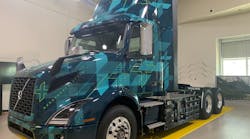Volvo plans to sell all-electric truck by end of 2020
Truck manufacturer Volvo Trucks North America (VTNA) announced a full battery electric version of the company’s VNR model will go on sale by the end of 2020. The announcement was made by VTNA President Peter Voorhoeve at a press conference during the American Trucking Associations’ Management Conference & Exhibition in San Diego.
The development of the eVNR has been supported through the Volvo LIGHTS project. LIGHTS, which stands for “low impact green heavy transport solution,” is a project aimed at explore the options available for the end-to-end usage of a fully electric commercial truck. This include the viability and development of the equipment, infrastructure, energy storage and creation, and system service.
The project has been supported through a $45 million investment from Volvo, along with another $45 million investment from the California Air Resources Board (CARB).
“This is the largest federal funded project, in terms of electromobiity. I’m very proud of that. This is the future, and it’s happening today,” Voorhoeve said.
“Not only do we show an electric truck we can drive from ‘A’ to ‘B,’ we show how it works in the greater picture,” Voorhoeve said. “We have our dealers involved, our technicians involved, we have electric yard trucks, we have the grid involved, we have renewable energy involved. Ultimately, if all those links work together, then you have a true, low-impact heavy transport solution.”
More details on Volvo LIGHTS project
Brett Pope, director, electric vehicles, and Chad Burchett, chief product manager, VNR, both with VTNA, shared insights on the Volvo LIGHTS project last month during the Volvo Technology Summit at the New River Valley Plant in Virginia. The project is exploring different options which will allow fleets a seamless transition to battery electric vehicles, taking into consideration how all segments of the vehicle’s usage for those customers – including the truck, infrastructure, and energy – will be made available to the market.
The optimal use case for full battery electric trucks would be for hub-to-hub, or daily return-to-base operations, where a vehicle can be recharged at the same location on a reliable and consistent basis. As infrastructure and energy storage improves over time, this would dictate an increase in market share for this vehicle type.
Pope suggested an evaluation for each fleet regarding duty cycle, routes assessment, and energy supply availability and storage would help ease the process of battery electric vehicle adoption. Onsite solar generation may also be a future consideration to manage power demands for some fleets. Volvo is currently exploring full lease options for both the trucks and the charging units, providing one monthly invoice for customers.
VTNA aims to provide full customer support from purchase through the life of the vehicle. “The intention is the electric product would be integrated into our existing tools and process,” Pope said.
The Volvo LIGHTS project is currently exploring how it can develop and include electric vehicles in its service and sales network, monitor real-world trials, and create partnerships with local colleges to develop electric vehicle repair and service technician programs.
“The goal is to repair, perform maintenance, and get the truck out the door to maintain productivity,” Pope said.
The Volvo LIGHTS project includes 16 public and private partnerships to explore all the possibilities to develop a use case and roadmap for full battery electric commercial truck adoption.
This includes infrastructure considerations. For example, through a partnership with Trillium, two Love’s Truck Stop locations in Placentia, California, will have charging stations installed. Additionally, Volvo is planning the placement of 51 additional charging stations for testing.
As far as the development of the vehicle itself, Volvo has had a hand in fully electric heavy duty vehicles for nearly a decade.
“The reason we can introduce this product in 2020 is Volvo started eletromobility over 10 years ago, with 10,000 electric buses and trucks operating in the world; 1,700 of those in North America,” Pope said. “In 2015, Volvo full electric bus was introduced. From this foundation, we can adapt this to trucks.”
Committed to planned expansion
Volvo also announced the expansion of its production facilities. The company plans to invest $400 million dedicated over six years in its New River Valley plant. The plant is intended to be the manufacturing facility for the electric VNR line.
The announcement comes after the debut of the eVNR at a Volvo Technology Summit held in New River Valley, Virginia, in September. VTNA President Peter Voorhoeve confirmed the eVNR will be assembled at the New River Valley plant.
“We see that our business in general will expand and we’re confident on where the future will go for us,” Voorhoeve said.




